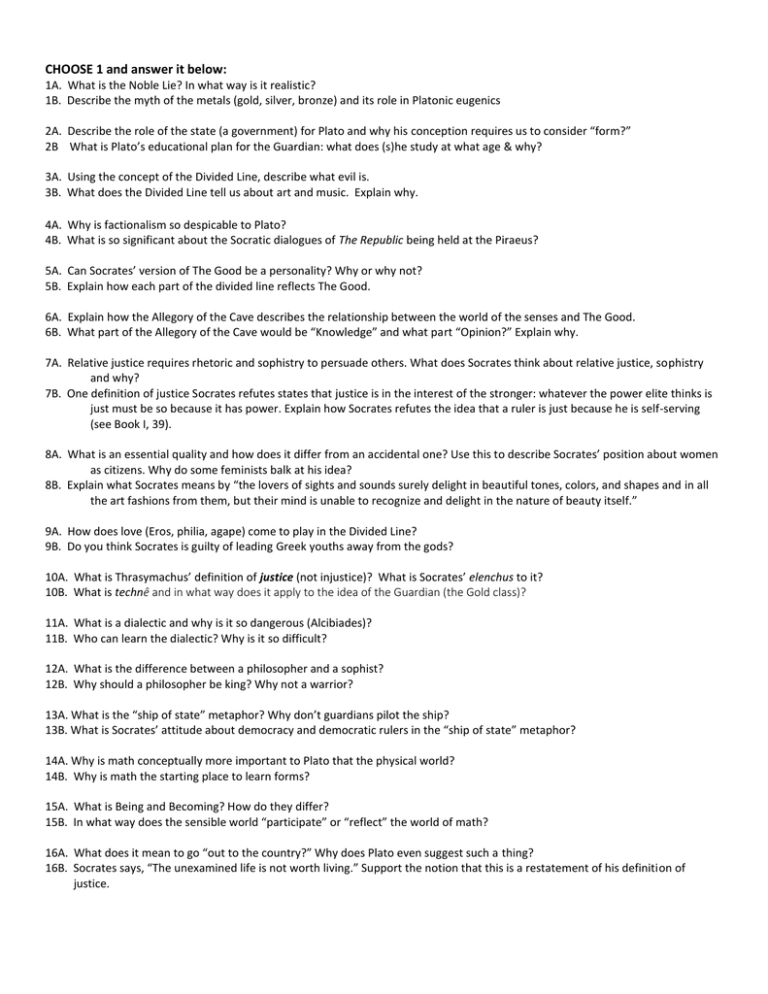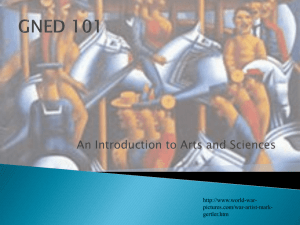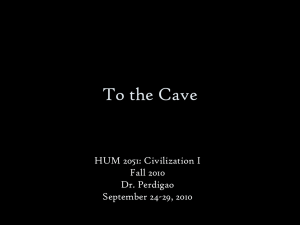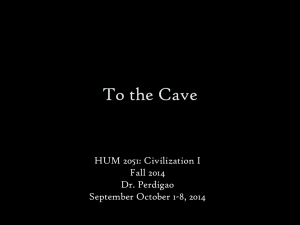CHOOSE 1 and answer it below: 1A. What is the Noble Lie? In what
advertisement

CHOOSE 1 and answer it below: 1A. What is the Noble Lie? In what way is it realistic? 1B. Describe the myth of the metals (gold, silver, bronze) and its role in Platonic eugenics 2A. Describe the role of the state (a government) for Plato and why his conception requires us to consider “form?” 2B What is Plato’s educational plan for the Guardian: what does (s)he study at what age & why? 3A. Using the concept of the Divided Line, describe what evil is. 3B. What does the Divided Line tell us about art and music. Explain why. 4A. Why is factionalism so despicable to Plato? 4B. What is so significant about the Socratic dialogues of The Republic being held at the Piraeus? 5A. Can Socrates’ version of The Good be a personality? Why or why not? 5B. Explain how each part of the divided line reflects The Good. 6A. Explain how the Allegory of the Cave describes the relationship between the world of the senses and The Good. 6B. What part of the Allegory of the Cave would be “Knowledge” and what part “Opinion?” Explain why. 7A. Relative justice requires rhetoric and sophistry to persuade others. What does Socrates think about relative justice, sophistry and why? 7B. One definition of justice Socrates refutes states that justice is in the interest of the stronger: whatever the power elite thinks is just must be so because it has power. Explain how Socrates refutes the idea that a ruler is just because he is self-serving (see Book I, 39). 8A. What is an essential quality and how does it differ from an accidental one? Use this to describe Socrates’ position about women as citizens. Why do some feminists balk at his idea? 8B. Explain what Socrates means by “the lovers of sights and sounds surely delight in beautiful tones, colors, and shapes and in all the art fashions from them, but their mind is unable to recognize and delight in the nature of beauty itself.” 9A. How does love (Eros, philia, agape) come to play in the Divided Line? 9B. Do you think Socrates is guilty of leading Greek youths away from the gods? 10A. What is Thrasymachus’ definition of justice (not injustice)? What is Socrates’ elenchus to it? 10B. What is technê and in what way does it apply to the idea of the Guardian (the Gold class)? 11A. What is a dialectic and why is it so dangerous (Alcibiades)? 11B. Who can learn the dialectic? Why is it so difficult? 12A. What is the difference between a philosopher and a sophist? 12B. Why should a philosopher be king? Why not a warrior? 13A. What is the “ship of state” metaphor? Why don’t guardians pilot the ship? 13B. What is Socrates’ attitude about democracy and democratic rulers in the “ship of state” metaphor? 14A. Why is math conceptually more important to Plato that the physical world? 14B. Why is math the starting place to learn forms? 15A. What is Being and Becoming? How do they differ? 15B. In what way does the sensible world “participate” or “reflect” the world of math? 16A. What does it mean to go “out to the country?” Why does Plato even suggest such a thing? 16B. Socrates says, “The unexamined life is not worth living.” Support the notion that this is a restatement of his definition of justice.






